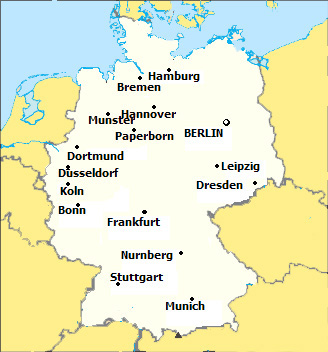German factory orders plummet as recession deepens
 Berlin - Key German factory orders plunged in October, data released Friday showed, with the nation's central bank predicting that Europe's biggest economy faces recession next year as the global economic downturn rapidly gains ground.
Berlin - Key German factory orders plunged in October, data released Friday showed, with the nation's central bank predicting that Europe's biggest economy faces recession next year as the global economic downturn rapidly gains ground.
The Ministry for Economics and Technology said German industrial order books contracted by a hefty and far bigger-than-expected 6.1 per cent month on month in October after shrinking by a revised 8.3 per cent in September.
"What started off as a relatively normal correction (in new orders) from very high levels has developed into serious collapse," said ING economist Carsten Brzeski.
"With emerging market growth slowing down and a recession in the industrialized world, the near term outlook for the German industry looks anything but rosy," he said.
As a further sign of how fast economic conditions are deteriorating for German industry, the world leading luxury carmaker, Munich-based BMW, reported Friday that sales plummeted by 25 per cent in November to 96,570 vehicles.
The German economy will contract by 0.8 percent next year, led by a slump in exports, the Bundesbank said in its latest economic projections. The release of the latest data came amid signs that credit markets were tightening up in the country.
German exports are likely to have grown by 4.4 per cent this year. However, the country, which is also the world's leading export nation can expect exports to fall by 0.5 per cent in 2009, the Bundesbank said.
The Frankfurt-based Bundesbank described the economic circumstances surrounding Germany as "severe," adding that the nation's economy is unlikely "to pick up again until the projected global economic upturn in 2010." The Bundesbank expects the Germany economy to have grown by a solid 1.6 per cent this year with growth rebounding to 1.2 per cent in 2010.
In the meantime, dwindling oil prices and slumping economic growth means Germany's inflation rate could drop to less than 0.5 per cent by the middle of next year or possibly even turn negative, the Bundesbank said.
Evidence that the economic downturn was gaining momentum in Germany coincided with the nation's parliament signing off on a stimulus package worth more than 30 billion euros (38.07 billion dollars), which Chancellor Angela Merkel's government said would generate an additional 50 billion euros in investment.
Analysts had forecast that Friday's order book figures would show the price and seasonally-adjusted industrial orders data posting a slight month-on-month rise of 0.4 per cent in October.
But with a grim roll call of economic indicators from around the world pointing to a global recession taking hold, Friday's German data showed domestic industrial orders falling by 6.1 per cent in October, while foreign orders fell by 6.2 per cent.
"All industrial groups reported lower orders in October compared to the previous month," the ministry said, releasing the latest order book data.
The release of the latest bleak German economic news came just one day after the European Central Bank delivered an unprecedented 75- basis-points rate cut aimed at helping spur growth in the 15-member eurozone and limiting the fallout from the world financial crisis.
Up until recently there had been signs that the eurozone had managed to avoid the credit squeeze unleashed by the US subprime mortgage market crisis.
But a survey released by the German Ifo economics institute Friday pointed to companies facing growing problems in arranging financing amid the deepening sense of gloom about the economic outlook.
About one third of the 4,000 companies responding to the survey reported a growing reluctance on the part of banks to lend money, Ifo chief Hans-Werner Sinn said releasing the survey.
"In particular large companies have been complaining that credit lines are restrictive," said Sinn.
But Sinn said he did not believe German companies were facing a credit squeeze, rather he said he saw higher hurdles to arranging credit. (dpa)